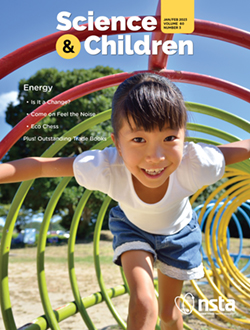
Volume 60, Number 3
Energy
In this issue of Science and Children, we address energy by examining how it can be a starting point for deeper learning, help build student-generated testable questions, foster scientific explanations, and allow students to trace energy through ecosystems.

Volume 60, Number 3
Energy
In this issue of Science and Children, we address energy by examining how it can be a starting point for deeper learning, help build student-generated testable questions, foster scientific explanations, and allow students to trace energy through ecosystems.

Volume 60, Number 3
Energy
In this issue of Science and Children, we address energy by examining how it can be a starting point for deeper learning, help build student-generated testable questions, foster scientific explanations, and allow students to trace energy through ecosystems.
Freebies and Opportunities for Science and STEM Teachers, January 24, 2023
By Debra Shapiro

Leadership Matters
Leadership Matters!
Leadership is essential for elementary science; however, leaders need support just as much as those they lead.
The Poetry of Science
Solar Power
Science and Children—January/February 2023 (Volume 60, Issue 3)
By Sylvia Vardell and Janet Wong
the early years
Preschoolers “On the Move” with Energy
Editor's Note
Energy
Science and Children—January/February 2023 (Volume 60, Issue 3)
By Elizabeth Barrett-Zahn
“Energy is liberated matter, matter is energy waiting to happen.”
— Bill Bryson, A Short History of Nearly Everything
“Energy is liberated matter, matter is energy waiting to happen.”
— Bill Bryson, A Short History of Nearly Everything
“Energy is liberated matter, matter is energy waiting to happen.”
— Bill Bryson, A Short History of Nearly Everything
Research & Teaching
Advice to Future Participants From Six Cohorts of an Undergraduate Summer Research Program in Atmospheric Science
Journal of College Science Teaching—January/February 2023 (Volume 52, Issue 3)
By Adam T. Murry, Nan Yuan, and Dean Atkinson
Many undergraduates use research internships to gain experience for graduate school. Science, technology, engineering, and mathematics (STEM) programs involve heavy research and lab work duties, for which students are often unprepared and lack opportunities for practice. Evidence supports Undergraduate Research Experience (URE) programs’ ability to improve retention in STEM, but research has not conclusively identified what students need to do to excel in these programs. This analysis used a multimethod approach to identify and quantify student-to-student peer advice from six cohorts of a summer STEM URE. We identified six themes in the advice from exit surveys: proactively manage time, communicate with your team, motivate yourself, be diligent, have fun, and accommodate changes in lifestyle. Each theme included between three and five subthemes that demonstrated nuance within the larger themes. Navigating the expectations of a URE is a complicated endeavor, but participants who are close to the experience provide rich descriptions to aid adjustment. Developing strategies for time management and team communication are most important, followed by motivation, work ethic, enjoyment, and practical adjustments.
Many undergraduates use research internships to gain experience for graduate school. Science, technology, engineering, and mathematics (STEM) programs involve heavy research and lab work duties, for which students are often unprepared and lack opportunities for practice. Evidence supports Undergraduate Research Experience (URE) programs’ ability to improve retention in STEM, but research has not conclusively identified what students need to do to excel in these programs.
Many undergraduates use research internships to gain experience for graduate school. Science, technology, engineering, and mathematics (STEM) programs involve heavy research and lab work duties, for which students are often unprepared and lack opportunities for practice. Evidence supports Undergraduate Research Experience (URE) programs’ ability to improve retention in STEM, but research has not conclusively identified what students need to do to excel in these programs.
Research & Teaching
A Mixed-Methods Analysis of Perspectives Toward Learning Assistant–Faculty Relationships
Journal of College Science Teaching—January/February 2023 (Volume 52, Issue 3)
By Cameron J. Hill, Anthony P. Barrasso, and Kathryn E. Spilios
Learning Assistant (LA) programs oversee and support undergraduate instructors and faculty members who work together to facilitate student learning in a variety of classroom settings. The success of an LA program is tied to experiences of the participants; therefore, understanding the perceptions of LAs and faculty is central to driving programmatic changes and ensuring positive outcomes. In this article, we use a mixed-methods approach to analyze the perspectives of LAs and faculty in Boston University’s LA program. Using surveys and one-on-one interviews, we highlight the qualities of a strong LA, the nature of LA-faculty relationships, the role of the LA in a course, and how faculty benefit from working with LAs. Our data suggest that interpersonal skills are imperative to be a successful LA, there is variation in how LAs and faculty interact, curriculum can be inclusive of LAs, and LA-faculty partnerships impact faculty understanding and implementation of evidence-based pedagogy. This article provides targeted, actionable suggestions for LA program improvements based on our analysis, as well as a foundation for future studies to further explore the impact of the LA model on faculty and LAs.
Learning Assistant (LA) programs oversee and support undergraduate instructors and faculty members who work together to facilitate student learning in a variety of classroom settings. The success of an LA program is tied to experiences of the participants; therefore, understanding the perceptions of LAs and faculty is central to driving programmatic changes and ensuring positive outcomes. In this article, we use a mixed-methods approach to analyze the perspectives of LAs and faculty in Boston University’s LA program.
Learning Assistant (LA) programs oversee and support undergraduate instructors and faculty members who work together to facilitate student learning in a variety of classroom settings. The success of an LA program is tied to experiences of the participants; therefore, understanding the perceptions of LAs and faculty is central to driving programmatic changes and ensuring positive outcomes. In this article, we use a mixed-methods approach to analyze the perspectives of LAs and faculty in Boston University’s LA program.
Research & Teaching
Beyond “See Figure 1”
A Heuristic for Writing About Figures and Tables
Visual elements such as graphs, tables, and diagrams are essential components of scientific writing. Although scientific writing textbooks and guides often contain information on how to design such visuals, little has been written on how to effectively discuss those visuals within the text. This article offers a novel heuristic for teaching students how to effectively execute these “passages about visuals” in a way that is both conceptually simple enough to be understood by novices yet rich enough to accommodate the complexity of expert scientific writing. The heuristic consists of a set of “moves”: announce, orient, observe, and explain. Following an explanation of the moves, readers are walked through a variety of examples showing the moves in context and noting the different ways the moves are arranged and executed in published scientific research articles. Pedagogical implications and approaches for using the heuristic in the classroom are then discussed.
Visual elements such as graphs, tables, and diagrams are essential components of scientific writing. Although scientific writing textbooks and guides often contain information on how to design such visuals, little has been written on how to effectively discuss those visuals within the text. This article offers a novel heuristic for teaching students how to effectively execute these “passages about visuals” in a way that is both conceptually simple enough to be understood by novices yet rich enough to accommodate the complexity of expert scientific writing.
Visual elements such as graphs, tables, and diagrams are essential components of scientific writing. Although scientific writing textbooks and guides often contain information on how to design such visuals, little has been written on how to effectively discuss those visuals within the text. This article offers a novel heuristic for teaching students how to effectively execute these “passages about visuals” in a way that is both conceptually simple enough to be understood by novices yet rich enough to accommodate the complexity of expert scientific writing.
Research & Teaching
How Do Students Interact With the Primary Scientific Literature in an Undergraduate Science Program?
Journal of College Science Teaching—January/February 2023 (Volume 52, Issue 3)
By Yi Hou, Heather Verkade, Jan van Driel



